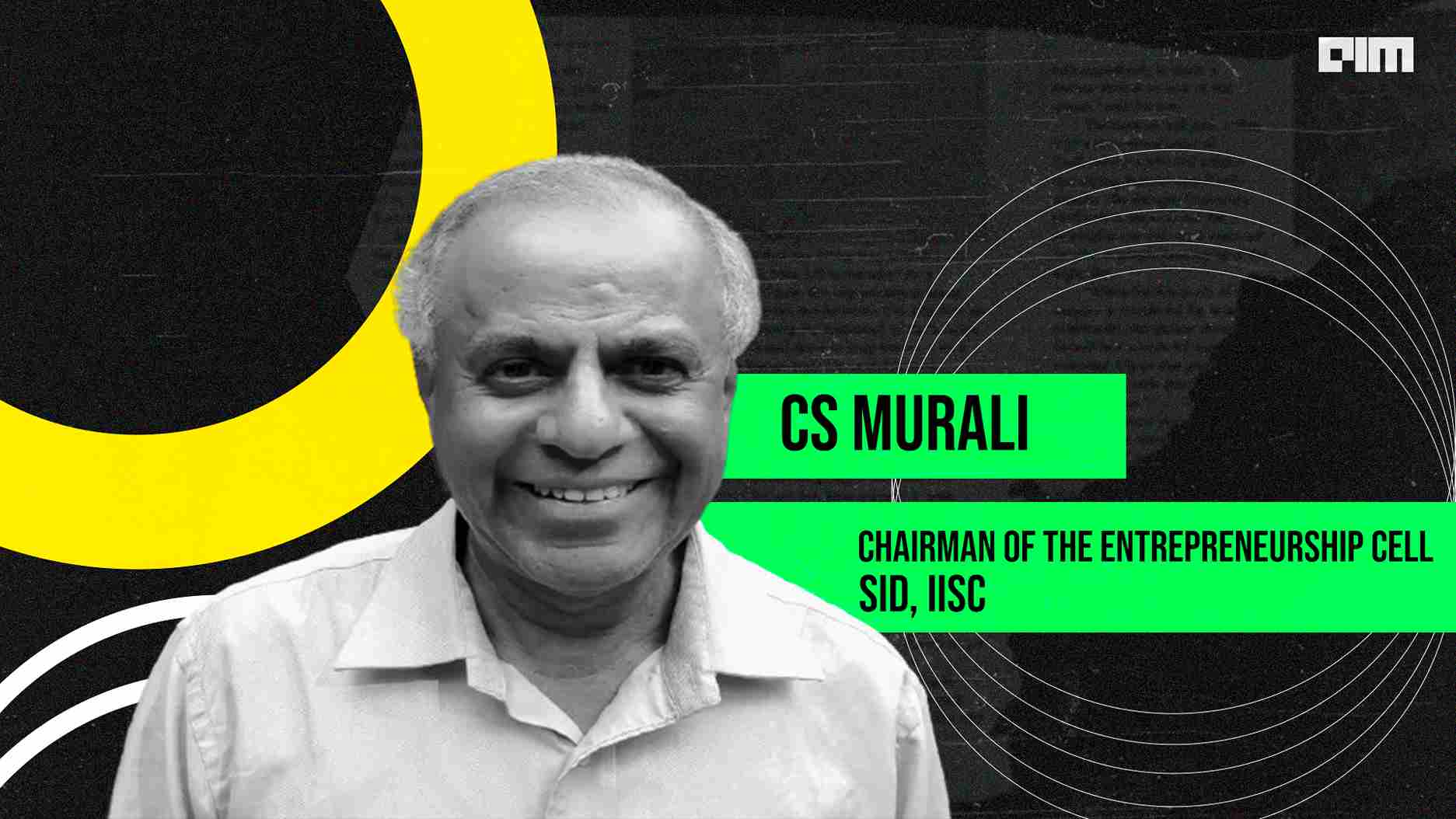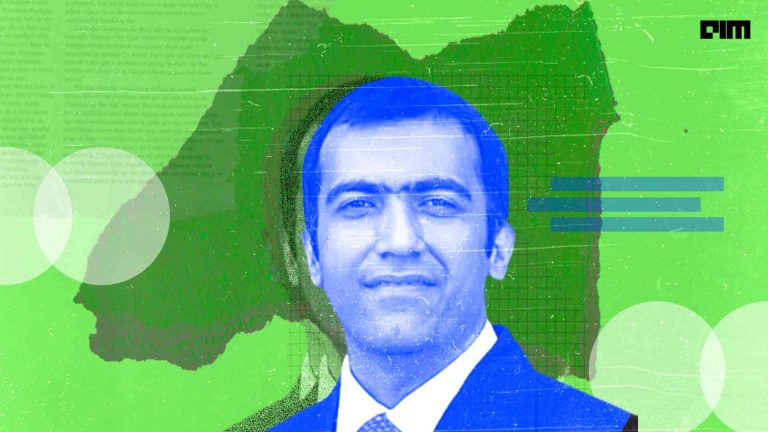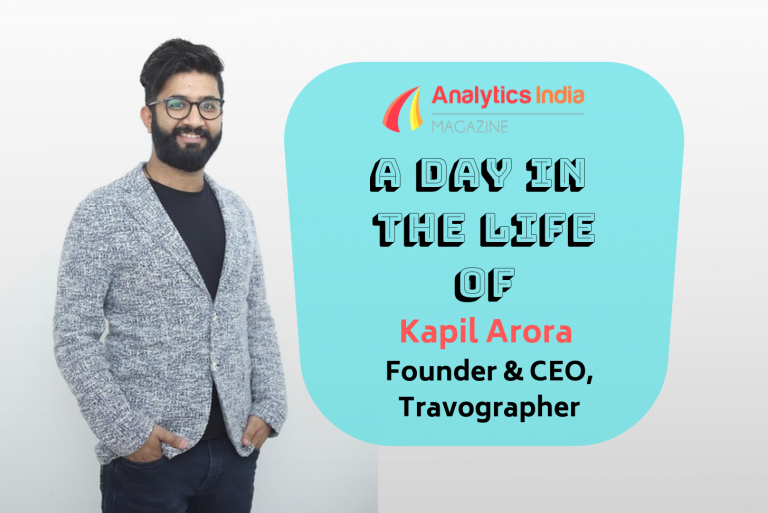The Society for Innovation and Development (SID), a wing of IISc, helps start-ups, MSMEs and large corporations to create innovative products and solutions. SID’s STEM Cell incubates start-ups focused on deep science and cutting edge technologies, specifically IP-driven firms. SID also has an EIR program to help entrepreneurs validate the commercial feasibility of their ideas.
CS Murali is currently the chairman of the entrepreneurship cell at SID. He did his graduation and Masters from IISc. Analytics India Magazine caught up with CS Murali to gain insights into India’s deep tech landscape.
Edited excerpts:
AIM: Tell us about your professional journey.
CS Murali: I am the chairman of the entrepreneurship cell at the Society for Innovation and Development in IISc. Prior to IISc, I was the chief of corporate affairs at Cognizant, where I led many corporate initiatives. I was a partner at Connect Capital — an early-stage venture capital firm, where my responsibilities included deal evaluation and portfolio management. I have also mentored many start-ups in strategy, fundraising and business development. My previous work roles include President and CEO of LEC India Software, COO of Digital Globalsoft (now an HP company) and general manager at IBM Global Services. I started my career with TCS, where I spent 15 years in various technical, sales and management positions.
AIM: What are your goals as the chairman of the entrepreneurship cell, SID at IISc?
CS Murali: Our charter is to translate scientific research to useful products and solutions via start-ups. In addition to commercialisation, we look for opportunities where deep science-based start-ups can create massive social impact. With space being an important resource and of national importance, we have incubated start-ups in wireless space communication, satellite propulsion, space situational awareness, etc. We have also incubated several start-ups in innovative medical diagnostics.
AIM: How do you select start-ups for your incubator?
CS Murali: After an initial assessment of the start-up idea, IISc faculty help us with a detailed evaluation of the underlying science and its status and potential. This is followed by a review of the start-up’s comprehensive business plan where experts from industry help us with their business perspective.
Unlike most other incubators, SID concentrates only on Deep Science and Technology start-ups that are commercially viable and can make a considerable societal impact. Deep Science start-ups warrant a longer gestation period to build products, a large amount of seed capital and space, and precision manufacturing. SID enables start-ups to access knowledge and laboratory resources at IISc. This also enables start-ups to get government grants. STEM has so far incubated 50+ start-ups. SID has recently laid the foundation for a new 12,000 square meters research park and, from next year, expects to induct ten new start-ups every year. Through government grants for entrepreneurship and incubation, it has been able to provide some seed capital to start-ups at incubation. SID has also raised some funding from private companies under their CSR initiative. It connects individual and institutional investors to start-ups and many of them have raised external capital from these sources. A few companies have raised funds through crowdfunding and syndication. The Government of India’s Atal Innovation Mission has provided a grant to SID to support start-ups.
Since deep science and technology start-ups need a large amount of money for prototyping, product testing, and precision manufacturing, their seed capital needs are significantly higher than pure software or services start-ups. Early funding, therefore, continues to remain a challenge for such start-ups.
AIM: What are your thoughts on the current crop of deep tech start-ups?
CS Murali: Nasscom estimates that there are 7,500 deep start-ups in India and we believe that it will go up significantly over the next five years. Major problems facing the country and the rest of the world such as clean water and energy, climate change and affordable healthcare can be solved by start-ups that use the latest technology.
AIM: Why do most deep tech start-ups get acquired by major players?
CS Murali: For a few decades now, large tech companies have recognised those breakthrough innovations happen in start-ups and hence use various acquisition strategies. Therefore, it is not surprising that most successful start-ups get acquired. A small number of them do go public and this will probably increase in the next few years.
AIM: What kind of start-ups get early funding? Is there a pattern?
CS Murali: Most venture capitalists invest in a start-up when it has some revenue or is close to it. Deep science and tech start-ups have a long gestation period, high upfront costs and have to survive in their early years through self-funding and government grants. Some of the new funds plan to invest at the seed stage in such start-ups, so hopefully we will see an improvement in the early-stage funding scene.
AIM: What is your advice to aspiring entrepreneurs in the AI and deep learning space?
CS Murali: It is important to recognise that effective machine learning requires a very large amount of data, so one should not expect it to be useful until after the application has been used for a long period. Also, there are several open-source frameworks available for AI and ML, so it is necessary to have the domain knowledge to apply it successfully and make it useful.
AIM: What steps can institutions and governments take to encourage entrepreneurship, especially in the emerging tech space?
CS Murali: Institutions need to select domains that they will support and create the common infrastructure and facilities needed by start-ups. Policy interventions to promote entrepreneurship are also important. Governments should increase the quantum of grants and the disbursal speed that are critical for a deep science and tech start-up in its early years.




















































































